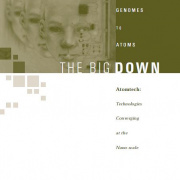Size Matters!
Submitted by ETC Staff on
The ETC Group today (14.04.2003) releases a new Occasional Paper, "No Small Matter II: The Case for a Global Moratorium - Size Matters!" The report calls on governments to adopt a moratorium on synthetic nanomaterials that are being manufactured in the laboratory and in some cases commercialized, in the absence of testing for health, safety and environmental impacts.
"Even though industry is scaling up the manufacture of nanoparticles and carbon nanotubes there appear to be no government regulations in Europe or North America to ensure the safety of workers or consumers," says Kathy Jo Wetter, ETC Group researcher. "A few national governments are beginning to consider some aspects of nanotech regulation but no government is giving full consideration to the socioeconomic, environmental, and health implications of this powerful new industry," notes Wetter. The ETC Group reports that nanoparticles are already available to consumers in sunscreens (including some intended for children, from infancy onwards) and cosmetics, among other products. However, regulators do not test nano-sized materials for health, safety and environmental impacts if their macro- or micro-sized counterparts have already been approved.

